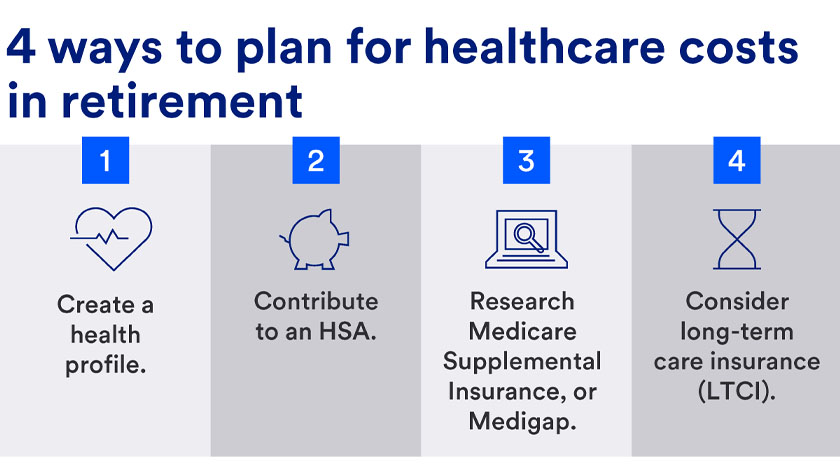
Key takeaways
With the average costs of healthcare on the rise and more Americans needing long-term care, it’s wise to take a conservative approach when it comes to budgeting for these costs.
Medicare covers hospitalizations, doctor’s visits and prescription drugs, but other health-related expenses, such as long-term care, are not covered.
Creating a health profile and understanding your saving and insurance options beyond Medicare may provide greater financial peace of mind as you enter into retirement.
Your retirement should be a time to relax and focus on enjoying all that you’ve worked hard for. Yet one of the biggest expenses you’re likely to face in retirement can catch you off guard if you don’t plan for it: healthcare costs.
To protect your financial security in retirement, it’s important to create a thoughtful plan that addresses the potential for long-term care and other healthcare costs.
This article will cover the average costs of healthcare in retirement and strategies for tackling all the medical and care expenses that Medicare may not cover.
What is the average cost of healthcare in retirement?
Average healthcare costs have been rising for decades. Relative to the size of the U.S. economy, healthcare costs jumped from 5% of GDP in 1962 to 17% of GDP in 2022.1
This has become a particular pain point for the many retirees who are likely to require long-term care or support. In fact, almost 70% of Americans turning age 65 today will require long-term care support at some point in their lives.2
One of the biggest expenses you’re likely to face in retirement can catch you off guard if you don’t plan for it: healthcare costs.
While it’s not be possible to predict exactly how much money you’ll need to save to cover healthcare costs as you age, the latest data suggests it’s higher than most people expect. According to one Fidelity report, an average 65-year-old couple may need approximately $330,000 saved to pay for healthcare expenses in retirement.3 That includes everything from insurance premiums and co-pays to deductibles, prescription drug costs and other expenses.
If you want to enter retirement better prepared for the unexpected, it pays to come up with a financial plan that factors in these costs.
What does Medicare cover?
Medicare is a federal health insurance program primarily for people aged 65 and older. While Medicare is a valuable benefit that serves as the cornerstone of healthcare coverage for most retirees, it’s not free – and it won’t cover all your healthcare-related expenses.
In general, here is what you can expect from Medicare coverage.
What Medicare covers
- Hospitalization (Part A)
- Doctor's visits and outpatient services (Part B)
- Prescription drug coverage (Part D)
What Medicare doesn't cover
- Long-term care
- Dental care
- Vision care
- Hearing aids
- Most routine physical exams
Medicare Part C, also known as Medicare Advantage, is another health plan choice that offers bundled plans through private insurers. Learn more about the different Medicare plans.
Will you get Medicare if you retire before 65?
If you’re ready to retire early, just keep in mind that you won’t be able to rely on any Medicare coverage until you turn 65. This means you would need to plan to cover health insurance premiums, plus out-of-pocket expenses, which could add up fast, depending on the medical care you’ll need.
Luckily, there are a few options to provide extra coverage before Medicare kicks in. These include:
- Insurance from a spouse. If your spouse is still working and you are planning to retire early, the simplest way to maintain health coverage is to stay on your spouse’s insurance plan until you turn 65. However, if both you and your spouse are considering early retirement, you’ll need to explore other options.
- Short-term health insurance plans. If there is a slight coverage gap between the end of employer-sponsored insurance and the start of Medicare, a short-term policy (up to 4 months) might be a smart option.
- Enroll in a Health Insurance Marketplace plan. If you need coverage for longer than 4 months, review your options on the Health Insurance Marketplace.
- COBRA. You may be able to continue your existing employer-provided health insurance for up to 18 months through COBRA. However, your employer will likely require you to pay the full cost of your coverage, plus a 2% administrative charge.
How can you pay for healthcare in retirement?
It’s never too soon to design a plan for paying healthcare costs once you’re retired. Here are four strategies for covering the cost of healthcare in retirement.

1. Create a health profile.
The first step in determining how much money you’ll need to pay for healthcare costs in retirement is to create a health profile. This can provide you with a realistic cost estimate based on factors such as your family history, potential long-term care costs and expected insurance costs.
Consider including the following data to estimate future healthcare costs:
- A realistic estimate of your longevity based on gender, family history and current life expectancy data.
- Expected insurance costs, including premiums, co-payments and deductibles.
- Anticipated expenses for prescription drugs, medical equipment and supplies, vision care, hearing aids and modifications to your home to make it more livable as you get older.
- Potential long-term care costs – either in-home or in a facility – keeping in mind that inflation may affect these expenses.
- An explanation of the benefits available to you, including a Health Savings Account (HSA) and Medicare Parts A, B, C, and D.
A financial professional can help you put this plan together, walking you through what information you’ll need and what projected costs look like.
2. Don’t forget your HSA.
You may already know the benefits of using an HSA to set aside funds for unexpected healthcare needs. But did you know that the money you save can be used for a wide range of healthcare costs in retirement, including insurance premiums?
Remember that $330,000 represents the average cost a couple turning 65 today will need over the course of their retirement to cover healthcare costs? HSAs offer important benefits that can help address this reality:
- They are triple-tax advantaged; you contribute pre-tax dollars, withdrawals for qualified expenses don’t incur taxes, and you can invest dollars outside of a certain threshold amount for healthcare expenses each year. The invested money in your account grows tax-deferred, which allows you to accumulate additional funds to help meet medical costs in retirement.
- HSA assets can be used to pay Medicare and other related insurance premiums, as well as out-of-pocket expenses.
- Services often not covered by Medicare – such as hearing aids, eyeglasses and dental care – can be paid for with HSA dollars.
- HSA distributions can also be applied toward long-term care insurance premiums and expenses.
If you’re enrolled in a high deductible health plan (HDHP) and you haven’t already, consider starting or increasing your contributions to a HSA, so you have enough of a cushion in retirement to pay for costs that Medicare won’t cover.
3. Try Medicare Supplemental Insurance.
To bridge the gaps in Medicare coverage, many people opt for Medicare Supplemental Insurance in retirement, also called Medigap. These plans help cover costs like copayments, deductibles and services not covered by original Medicare.
Offered by private insurance companies, Medigap policies typically require you to have both Medicare Part A and Part B.
In addition to your regular Medicare Part B premium, you’ll pay a monthly premium to your Medigap insurer. If you keep up with these payments, your Medigap coverage will automatically renew every year.
4. Consider long-term care insurance.
Medicare does not generally cover long-term care. But because so many Americans will require this type of support at some point in their lives, it’s wise to plan for the possibility.
Medicare does pay for skilled care in a nursing home, but only for short periods (up to 100 days) during which you are recuperating following a hospital stay for a related condition – but that’s not the same as long-term care. Medicare will not pay for ongoing personal or custodial care.
Long-term care insurance (LTCI)is a great option as it covers more costs than Medicare alone and can be used in a variety of care settings. LTCI can be purchased as a standalone policy or as a component of certain life insurance policies. Consider meeting with a financial professional now to review your LTCI options. The younger you are, the more affordable these policies are to fund long term care.
The importance of planning for healthcare costs in retirement
Regardless of when you retire, it’s important to have a plan for ongoing healthcare coverage. A financial professional can help you create a health profile and income strategy that addresses your concerns, so you can enter retirement with less stress and more freedom to enjoy the fruits of your labor.
Learn about our comprehensive approach to retirement planning.
Tags:
Explore more
How to plan for retirement
You probably have big dreams for retirement. That’s why comprehensive retirement income planning – for the short, medium and long term – is so important.
Your vision for retirement starts with a clear plan.
Our planning services and professional guidance can help you work toward a more secure and fulfilling retirement.


